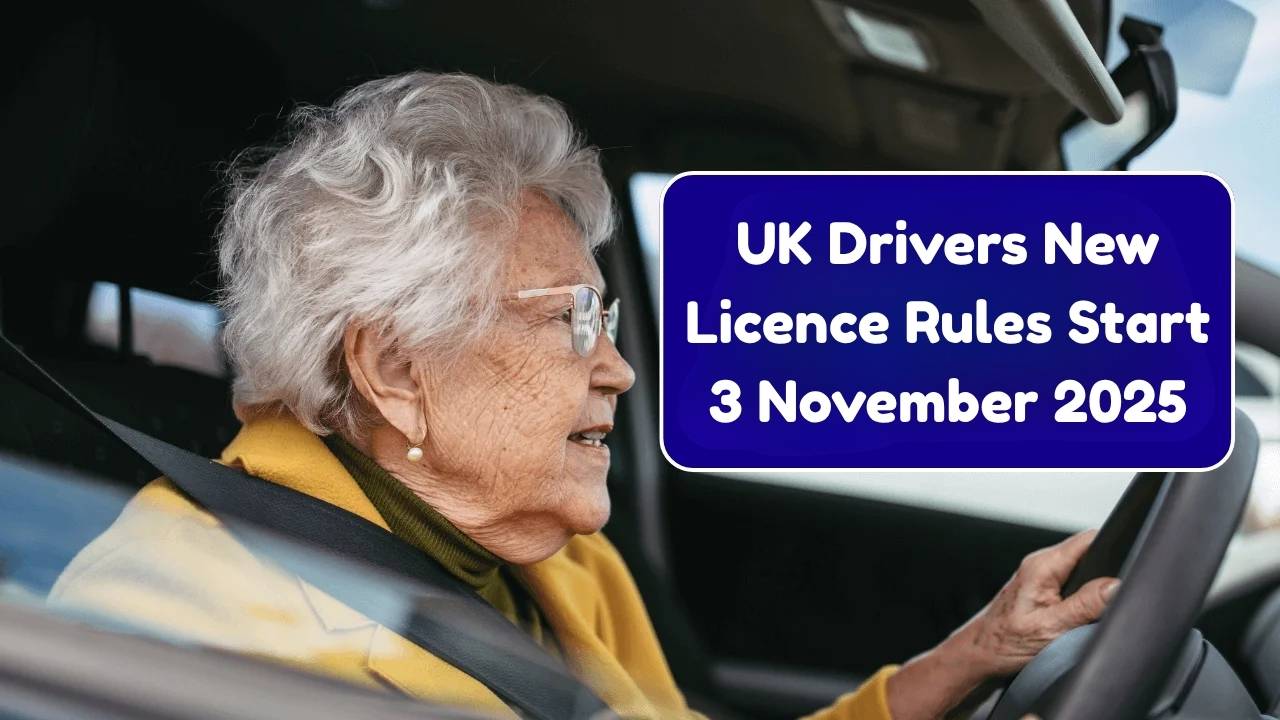The UK government has confirmed a series of new driving licence rules set to take effect from 3 November 2025, specifically targeting drivers aged 55 and above. This move marks one of the most significant updates to driving regulations in recent years, aimed at improving road safety, ensuring medical fitness to drive, and aligning licensing policies with the country’s aging population. The changes are expected to affect millions of motorists across England, Scotland, Wales, and Northern Ireland, sparking both support and concern among older drivers.
Why the New Rules Are Being Introduced
Over the past decade, the number of older drivers on UK roads has grown rapidly. According to data from the DVLA, more than five million people over the age of 55 currently hold full driving licences. With this rise, the government has expressed a need to modernise the system to reflect changing health patterns, vehicle technologies, and road safety statistics. The new measures are designed to ensure that drivers in this age group remain fit to drive safely while maintaining their independence and mobility.
Road safety remains the top priority. Officials from the Department for Transport have pointed to evidence suggesting that age-related conditions—such as slower reaction times, declining eyesight, and certain medical issues—can increase the risk of accidents. The new policy aims to identify and manage these risks early through updated renewal and medical requirements.
Key Changes to the Driving Licence Rules
From 3 November 2025, several new requirements will come into force for drivers aged 55 and above. The most notable change involves the frequency of licence renewals. Currently, most drivers renew their licence every ten years, but under the new system, those aged 55 to 69 will need to renew every five years. For drivers over 70, the renewal period remains every three years.
Another major update relates to medical self-declarations. Drivers over 55 will be required to provide more detailed medical information when renewing their licence, including updates on eyesight, diabetes, sleep disorders, and any medication that may impair driving ability. For certain medical conditions, the DVLA may request a doctor’s certificate or eye test results to confirm eligibility.
Additionally, new digital tools are being introduced to simplify the process. The government plans to expand the DVLA’s online portal to allow drivers to upload medical documents, book eye tests, and track the progress of their renewal applications. This shift to digital services is expected to reduce delays and make renewals more efficient.
How the Changes Will Affect Older Drivers
For most drivers over 55, the impact will be relatively minor, but it does mean keeping closer attention to renewal dates and health requirements. Those who continue to drive regularly and maintain good health should have no difficulty meeting the new standards. However, the updated process may require a bit more preparation and awareness.
Drivers who rely on their vehicles for work, caregiving, or community activities have raised concerns about the potential for delays or added costs in obtaining medical certificates. In response, the government has clarified that most renewals will remain free of charge unless a full medical assessment is needed. Furthermore, local opticians and general practitioners will be encouraged to offer discounted services for licence-related checks.
Safety and Public Response
The reaction from the public and motoring groups has been mixed. Road safety organisations, including Brake and the Royal Society for the Prevention of Accidents (RoSPA), have praised the move as a necessary step to ensure safer roads. They highlight that as vehicles become faster and more advanced, periodic health assessments will help reduce preventable accidents involving older drivers.
However, some advocacy groups for seniors argue that the new rules could create unnecessary anxiety among older motorists, especially those living in rural areas with limited public transport options. They stress that age alone should not determine driving ability and call for flexible testing that focuses on individual capability rather than strict age brackets.
The government has responded by stating that the policy is not about restricting independence but about promoting confidence and safety. Officials have assured that the changes will be reviewed regularly and adjusted if they cause undue hardship to responsible drivers.
Preparing for the New Licence Rules
Drivers aged 55 and above are encouraged to start preparing well ahead of the November 2025 implementation date. Here are some steps that can help ensure a smooth transition:
- Check your licence expiry date and mark renewal reminders.
- Schedule regular eye and medical check-ups to stay aware of any changes.
- Register for a DVLA online account to manage your documents and updates easily.
- Keep your address and contact information up to date with the DVLA to avoid delays.
- Seek advice from your GP if you’re unsure how a health condition might affect your licence renewal.
By taking these proactive steps, older drivers can continue to enjoy the freedom of driving while complying with the new regulations.
The Future of Driving in an Aging Society
The UK’s decision to update driving licence rules for over-55s reflects a broader trend among developed nations to modernise driver fitness standards. With the population living longer and staying active later in life, policymakers are focusing on ways to keep older drivers safe without compromising independence.
As car technology evolves—with the rise of electric vehicles, driver assistance systems, and eventually autonomous cars—the driving experience for older citizens will also change. The new rules are a stepping stone toward a more adaptive, tech-driven future of mobility.
While change often comes with challenges, these measures are meant to create a fair balance between safety and freedom, ensuring that every driver—regardless of age—can continue to travel with confidence.
Conclusion
The introduction of the new driving licence rules for UK drivers over 55 marks an important moment in the country’s transport policy. Starting 3 November 2025, motorists in this age group will need to adapt to shorter renewal cycles and enhanced health checks designed to keep roads safer for everyone. Though some may view the rules as stricter, the long-term goal is to maintain trust and safety in the driving community. With proper preparation and awareness, older drivers can continue to enjoy their independence while meeting the highest standards of road responsibility.
Disclaimer
This article is for informational purposes only and should not be considered official legal or driving advice. Regulations may vary based on individual circumstances. Readers should verify details directly with the DVLA or a qualified professional before making decisions related to driving licence renewal or medical assessments.
FAQs
1. When will the new driving licence rules for over-55s take effect?
The new rules will officially start on 3 November 2025 across the United Kingdom.
2. How often will drivers over 55 need to renew their licences?
Under the new system, licences must be renewed every five years for those aged 55 to 69.
3. Will drivers need a medical certificate to renew their licence?
Not always. Most drivers will only need to complete a detailed self-declaration, but those with specific medical conditions may need confirmation from a doctor or optician.
4. Do the new rules apply to all types of vehicles?
Yes, the new renewal and medical requirements apply to car, motorcycle, and commercial vehicle licences.
5. How can older drivers prepare for these changes?
By keeping medical records updated, booking regular eye tests, and renewing licences early through the DVLA’s online portal.



